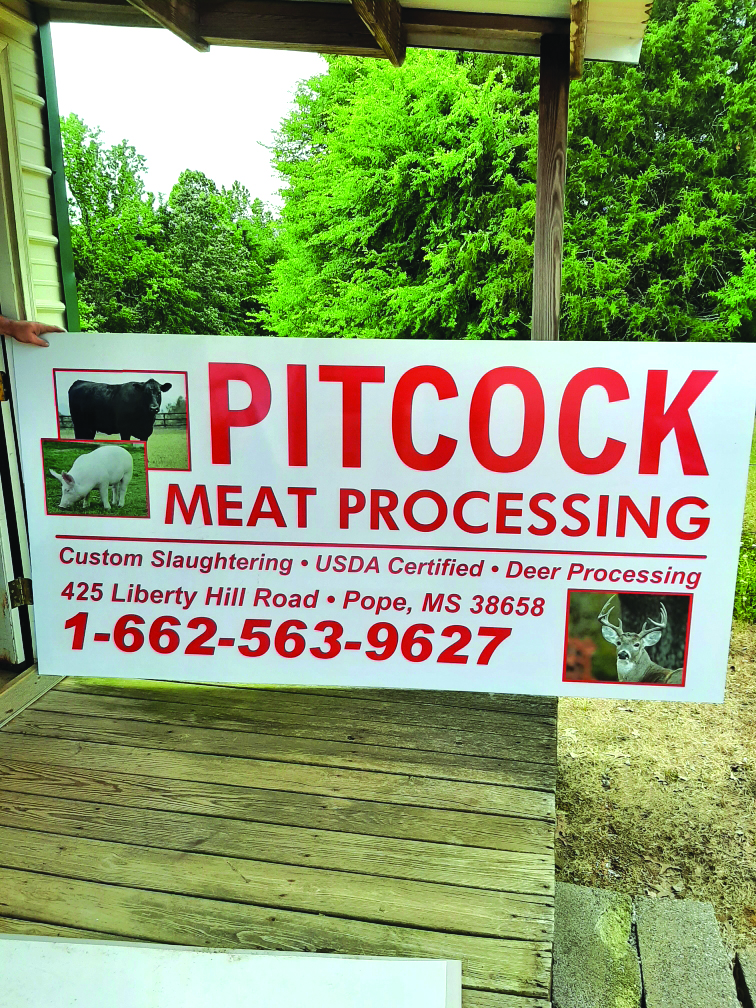Pitcock Meat Processing announces major expansion
Published 4:49 pm Tuesday, June 1, 2021
The Mississippi Land, Water and Timber Resources Board (LWTRB) has approved $3.1 million in financial assistance to seven livestock processing facilities to increase their capacity following interruptions in the food supply chain due to the COVID-19 pandemic, including Panola County’s Pitcock Meat Processing located at 482 Liberty Hill Road outside east of Pope.
The Board, co-chaired by Commissioner of Agriculture and Commerce Andy Gipson and Executive Director of the Mississippi Development Authority John Rounsaville, approved funding to expand currently operating USDA-inspected processing facilities and construct new USDA-inspected facilities.
“Last May, when the pandemic was still new, I announced steps toward making Mississippi’s food supply chain more resilient. We removed limits on the number of owners allowed per animal for custom slaughter. We created MSFarmMarketplace.com to connect directly farmers and consumers to enhance farm-to-table supply lines. We provided guidance to farmers markets across the state so if they chose to remain open, they could operate safely. And, we invited meat processors in the state to submit applications to expand their operations. A year later, we have approved $3.1 million to effectively double Mississippi’s domestic meat processing capacity,” Commissioner Gipson said.
Trending
Pitcock Processing, Inc, was awarded a grant in the amount of $494,745.80 and a loan in the amount of $329,897.20 to construct a new USDA-inspected processing facility and purchase equipment. Owner Tony Capwell bought the business 16 years ago from Cecil and Jim Pitcock. The business was founded in 1975 and has served generations of Panola County families with their custom processing capabilities.
Pitcock Processing has been state inspected for several years and is currently allowed to sell pork products in Mississippi. When the new 5,400 square foot facility is completed it will become eligible for USDA federal inspection and meats can then be sold nationwide.
Capwell has five full-time employees and hopes to add more when the facility is completed.
“We are super excited about the new processing plant and when we get ramped up I hope we will be able to add experienced meat cutters to take care of increased business,” Capwell said. “We have the ground leveled and some gravel in place so it won’t be long before we can move forward.”
Pitcock Processing saw an increase in demand for fresh cut meats during the pandemic, with customers driving as much as five hours to buy beef, pork, and have their harvested deer processed.
“I saw what was happening before the pandemic really got bad with meat prices and availability so I started buying all the meat we could afford,” Capwell said. “It paid off because there were times when we were able to sell fresh meat to our customers when they couldn’t buy it at area grocery stores.”
Trending
The quality of Pitcock’s meats also helped grow the business during the pandemic, Capwell said.
“We can provide our customers with half or whole beef that comes directly from local farmers,” he said. “When people eat fresh cut meat instead of what is available at grocery stores they can taste the difference right way. That’s where we get many of our repeat customers.”
“Once people have an opportunity to eat fresh meat they always want to come back,” Capwell said. “Whether it’s custom processing or the cuts of meat that everyone is familiar with in grocery stores, Pitcocks will be able to fill any order.”
Capwell said the decision by state officials to fund the expansions of processors around the state will mean that in future times of crisis “Mississippi will be able to take care of Mississippi and Panola County will be able to take care of Panola County.”
The other Mississippi LWTRB approved applications from Mississippi processors are:
- ● Attala Frozen Foods in Attala County, was awarded a grant in the amount of $611,110 to expand its USDA-inspected processing facility. The grant allows for the building construction and the purchase of equipment.
- ● Homestead Farm and Packing in George County, was awarded a grant in the amount of $49,700 to purchase new equipment to increase the processing capacity of its USDA-inspected processing facility.
- ● Cutting Edge Meat Co. in Greene County, was awarded a grant in the amount of $350,000 to assist with the cost of constructing a new USDA-inspected processing facility and purchasing equipment.
- ● A Cut Above Meat Processing and Market, LLC in Hancock County, was awarded a grant in the amount of $529,560 and a loan in the amount of $353,040 to construct a new USDA-inspected processing facility and purchase new equipment.
- ● Blue Sky RE, LLC in Rankin County, was awarded a grant in the amount of $304,385 to purchase a USDA-inspected mobile processing unit and modular cut and wrap facility. This innovative mobile facility providing USDA-inspected slaughter on-site at Mississippi farms is the first of its kind in the state.
- ● Juniper Creek Farms, LLC in Pearl River County, was awarded a grant in the amount of $70,000 to construct an on-farm USDA-inspected poultry processing facility.
- “The past year has been difficult for many industries in Mississippi, and agriculture is no exception,” said MDA Executive Director John Rounsaville. “The intent of these loans and grants is to enhance market opportunities for livestock producers and processors while simultaneously strengthening our agricultural economy.”
- The number of USDA-inspected facilities that provide slaughtering and processing services to the public will double. A new mobile processing unit, the first of its kind in Mississippi, will bring the slaughtering component direct to the farm. The increased number of facilities will provide additional opportunities for farmers and will potentially decrease the number of miles cattle must be transported.
- “Expanded capacity in processing is a game-changer for local consumers and the livestock industry, and another step toward increasing access to local food. We want to ensure Mississippi has the necessary local food infrastructure to meet growing local demand, as well as guard against supply and distribution interruptions due to workforce and plant capacity challenges in other states. Through the expansion of currently operating USDA-inspected facilities and the construction of new USDA-inspected processing facilities, we are on track to more than double the livestock processing capacity in Mississippi,” said Commissioner Gipson.






